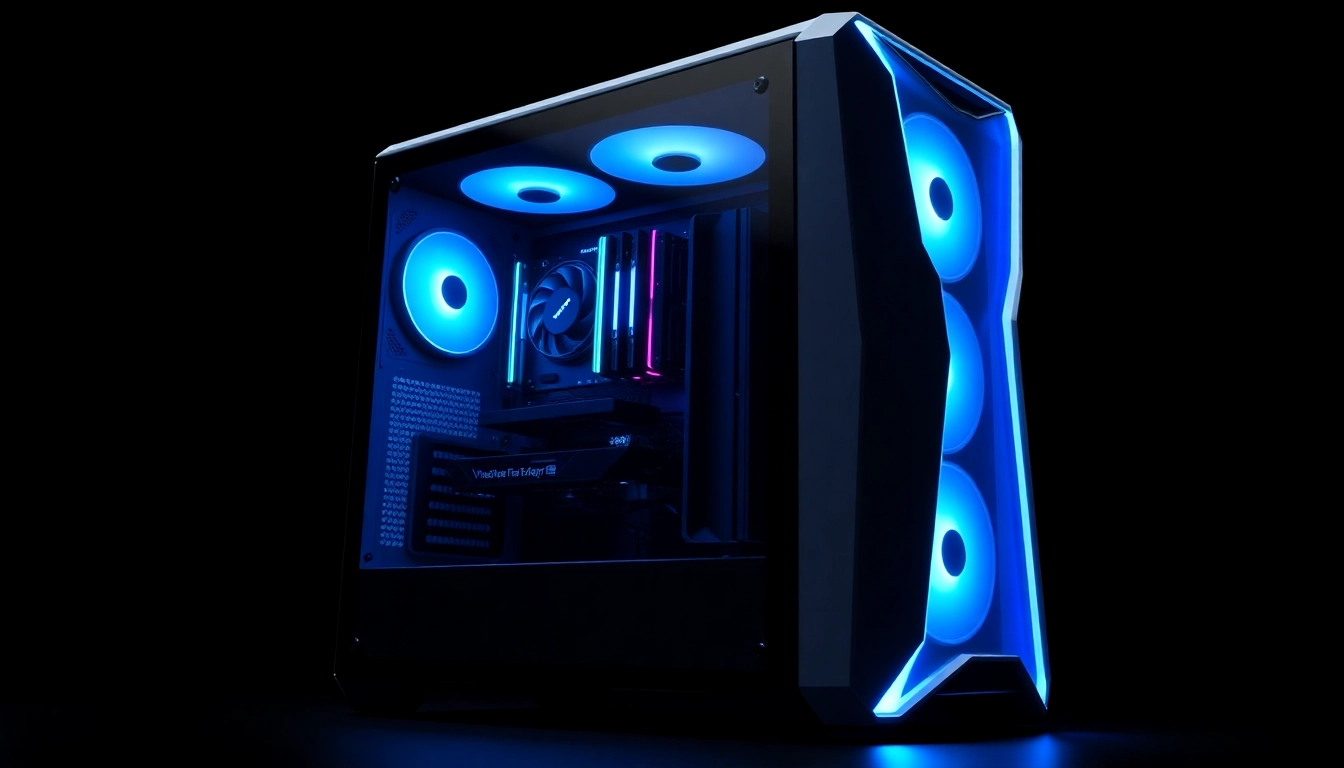
Understanding Gaming PC Cases
What is a Gaming PC Case?
A gaming PC case is a critical component for any gaming setup, serving as the housing for your computer’s essential parts such as the motherboard, CPU, GPU, and power supply. Beyond mere functionality, it acts as a medium through which heat dissipation occurs, supports airflow management, and provides a visually aesthetic aspect to your gaming rig. With the increasing popularity of PC gaming, the demand for specialized gaming PC cases has surged, leading to an industry filled with diverse options tailored to different needs and preferences.
Types of Gaming PC Cases Explained
When selecting a gaming PC case, it’s essential to understand the various types available in the market:
- Full Tower Cases: These cases offer maximum space for components, ideal for high-end builds and extensive upgrades.
- Mid Tower Cases: A popular choice, mid-tower cases provide a balanced size and compatibility for a majority of components.
- Mini Tower Cases: Compact and space-saving, these cases are perfect for smaller builds but may limit upgrade options.
- Micro ATX Cases: Designed for micro ATX motherboards, these cases combine compact form factors with adequate space for components.
- Mini ITX Cases: These are the smallest, suitable for Mini ITX motherboards, often emphasizing portability.
Key Features of Gaming PC Cases
Choosing the right gaming PC case can significantly affect your gaming experience. Here are vital features to consider:
- Cooling Solutions: In-built fans, radiator support, and airflow design help maintain optimal temperatures.
- Space Management: Enough room for additional drives and peripherals is crucial, especially for gamers looking to upgrade over time.
- Build Quality: Superior materials and construction enhance durability and aesthetics.
- Accessibility: Tools-free access and cable management options simplify the build and maintenance process.
Choosing the Right Size for Your Gaming PC Case
Standard Sizes: ATX, Micro ATX, and Mini ITX
The size of your gaming PC case is vital for compatibility and performance. Each standard has its unique characteristics:
- ATX: The standard size, offering plenty of room for advanced cooling and multiple expansion slots.
- Micro ATX: Slightly smaller, thus limiting expansion but still suitable for most users.
- Mini ITX: Compact cases for smaller builds, which may sacrifice some performance in favor of space saving.
How to Determine the Best Fit for Your Components
Before choosing a case, take time to measure the dimensions of your components, especially your graphics card, CPU cooler, and motherboard. Gaming CPUs and GPUs can vary significantly in size, and knowing beforehand will ensure compatibility. Most manufacturers provide detailed specifications allowing you to match component dimensions to your desired case.
Impact of Size on Cooling and Airflow
The size of the case not only determines the fit of your components but also impacts cooling efficiency. Larger cases generally allow for better airflow with more fans and larger radiators, greatly enhancing thermal performance. On the other hand, smaller cases may reduce airflow and lead to overheating issues, necessitating careful consideration of fan placement and cooling systems. gaming pc case design is quintessential in addressing these thermal needs.
Design and Aesthetics of Gaming PC Cases
Popular Styles and Trends in Gaming PC Cases
Gaming PC cases come in various designs and styles catering to the tastes of gamers. Popular trends include:
- Tempered Glass Panels: Most gaming setups now feature transparent panels that allow users to showcase their interiors.
- RGB Lighting: Dynamic lighting has become a norm, providing a customizable aesthetic experience.
- Minimalist Designs: Innovative designs that promote simplicity while maintaining elegance are gaining traction.
Choosing Colors and Lighting for Your Setup
The colors and lighting of your gaming PC case can set the mood for your overall gaming experience. It’s wise to consider establishing a theme that complements your other peripherals, such as keyboards and monitors. Most modern cases come with customizable RGB lighting options, allowing you to synchronize color schemes across your devices for a seamless setup.
Customization Options: From Panels to Accessories
Customization is key to creating a truly unique gaming setup. Options may include:
- Interchangeable Panels: Many manufacturers offer different designs or material options, allowing users to switch up their case’s look.
- Modifications: Enthusiasts often modify their cases with additional cooling solutions or custom paint jobs.
- Accessory Add-ons: From additional fans to water cooling systems, many upgrade paths exist to enhance a case’s capabilities.
Cooling Solutions in Gaming PC Cases
Importance of Airflow in Your Gaming PC Case
Effective airflow is crucial for a gaming PC’s performance, especially during intense gaming sessions. Proper airflow design ensures that cool air flows in and hot air is efficiently expelled. Look for cases that feature strategic fan placement, mesh panels, and airflow tunnels, as these can drastically affect thermal performance.
Built-in Cooling Features to Look For
When selecting a gaming PC case, consider these built-in cooling features:
- Pre-Installed Fans: Several cases come equipped with fans already installed, saving you additional costs.
- Fan Control Hubs: They enable users to control fan speeds to balance noise and performance.
- Radiator Support: Look for cases that can support liquid cooling solutions for optimal thermal management.
Aftermarket Cooling Solutions and Upgrades
For those wanting to go above and beyond, aftermarket cooling solutions can improve performance significantly. Brands like Noctua and Corsair offer high-end CPU and GPU cooling systems that can be integrated into your build smoothly. Liquid cooling kits or thermal paste upgrades can further assist in better managing temperatures.
Budgeting for Your Gaming PC Case
Price Ranges and What You Get at Each Level
Gaming PC cases range significantly in price, impacted by size, features, and brand. Here’s a breakdown:
- Budget Cases ($50 – $100): Typically made from lighter materials, these cases may lack advanced cooling features but provide adequate space for basic builds.
- Mid-Range Cases ($100 – $200): A good balance of build quality, cooling options, and aesthetics is seen in this range.
- High-End Cases ($200 and above): Featuring customizations, premium materials, and extensive cooling solutions, these are designed for serious gamers and enthusiasts.
Best Value Gaming PC Cases on the Market
For budget-conscious gamers, several cases provide outstanding value without compromising too much on features. Models from brands like NZXT, Corsair, and Fractal Design often combine durability with a plethora of features suitable for beginner builds.
Tips for Avoiding Overpaying for Features
When shopping for a gaming PC case, be cautious of inflated prices due to brand names or unnecessary features. Always assess the specific needs of your build against the features offered. Understand what is essential for your gaming experience and avoid case designs that tout minimal enhancements at a premium.






